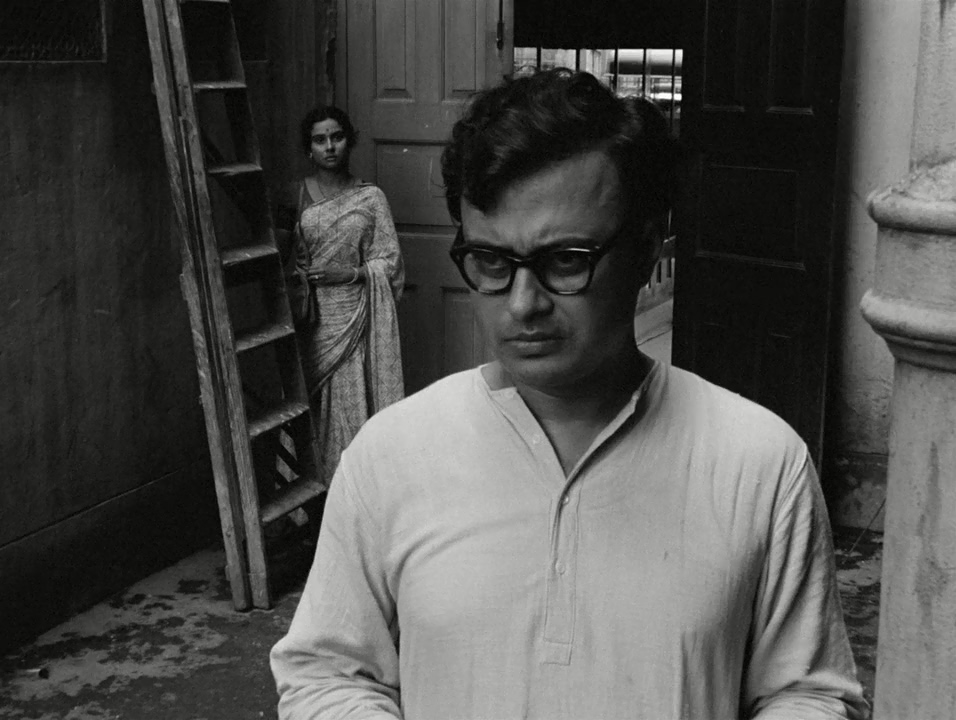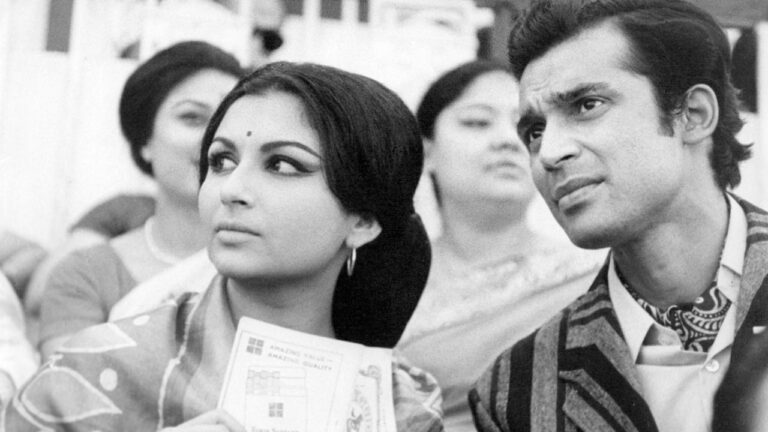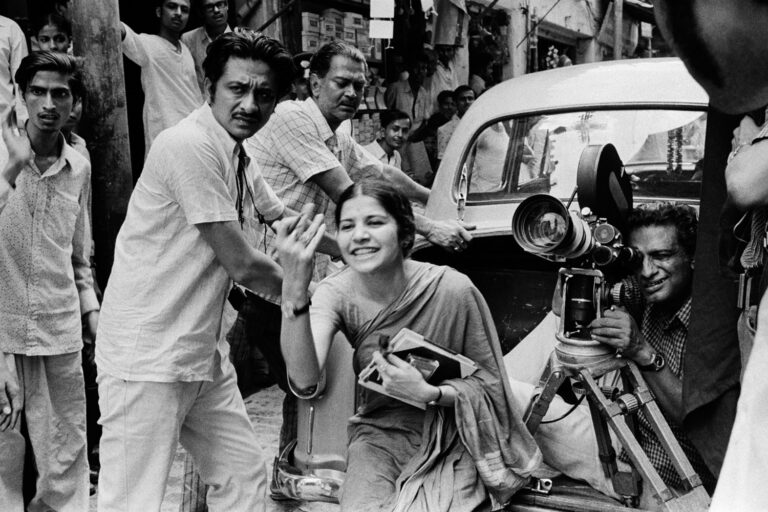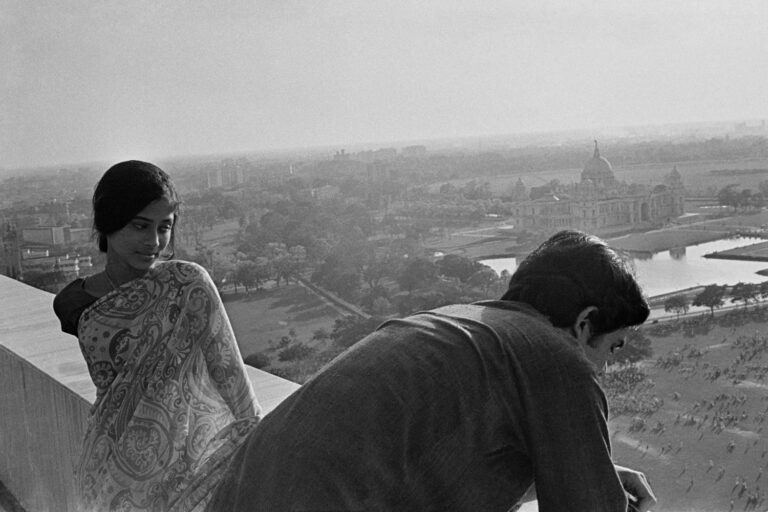I probably jumped the gun. You see, the vice of quoting something is a feverish act. There’s a passage, a scene, a song – what better than to slap a quote onto it by jogging your memory? I raised a quote in my previous post on Seemabaddha about Tagore’s words to a young Ray, a mini-Eureka moment of itself. With Mahanagar, out of all of Ray’s films, I feel that quote to be most apt. But it hardly makes a difference. That quality of a droplet, its perfect convexity, is the soil of any Ray film, and though it may have been much more prominent – perhaps, even overtly intentional – in other works of his that I am yet to view, its consequence merits from the subject of its reflection in this film. The working woman, or more precisely, the working-class working woman is a subject that is at the bedrock of cultural change in Indian society. The tidal waves of post-industrial women’s rights made their way into India, and the change in the roles of a household happened more surreptitiously than they did elsewhere. Debates, wrung hands, and growing consternation did not manifest as vociferously on the streets of the country as they did in the Western world, but behind the walls of poorly-lit rooms. So, quite suitably, this droplet holds a household whose stability has been upended, reflecting a new coming for the nation. Good or bad? If you’ve followed Ray long enough, you’d know that he’s never one to tell you that. Neither shall I, but I fear I’d succeed less in cloaking my biased hindsight.
Before noting about the film itself, I’d like to revisit my fondness for Ray. In many ways, he’s my favorite progressive because he isn’t quick to print the need for change on his sleeve. Yes, he is acutely aware of the need for change – as one sees in Devi – but he also refuses to categorically reject what is already present as he does in Mahanagar. A true rationalist during a time when cinema was seen as a vehicle for change, he was aware of the treacly nature of subjects. Many claimed that he was for the status quo, especially when placed alongside his then contemporaries – Ghatak and Sen. This brought me to a question that I ask myself – should have Ray been more politically insistent instead of this lukewarm approach and if so, would his cinema have benefited from it? Would Apu be less guilty if his mother accused him, even momentarily, of being self-absorbed? Would Shyamal be so too if he were threatened to action by his higher-ups? I’ve grown to detest such cinema because it presumptuously assumes that the world is bright or bleak. You live and suffer long enough to know cold reason alone cannot fill blanks at every turn, and despite its utility, Ray doesn’t bat for it more than is necessary. In all his films, he deters from placing me as an adjudicator, but he isn’t comfortable letting me be a witness either.
Mahanagar, lined with such walls of trepidation, begins with the promise of discomfiture in a traditional Indian household – a husband who leaves his worries outside the house along with his slippers, and a wife who is left to divine the austerity to pursue from what anguish his face may betray. But Bhombol and Aarti are unusual – they seem to express the outcomes of their day as is. From the outset, we see that there are no empty ideals of the valiant, tight-lipped husband and the meek and subservient wife. She’s extremely inquisitive about the state of his affairs and he’s jovially nonchalant. “A housewife should stay in her house and not wander about,” he says as he fobs her off with his tongue. Between themselves, they both know that their ideals won’t help maintain their untenable position – she needs to work. He gives into her wish and fills up her application forms. When she’s called for an interview, he even guides her lies to avoid suspicion at home. Throughout all this, Bhombol beats down any sign of suspicion, second-guesses, and the infamous inferiority. He seems to be a very supportive husband, quite ahead of his times, even if he himself believes to be “very conservative” like his father.
Though we see early traces of gender conformity in both of them, it isn’t whacked out of beat until she brings home her first salary. He slowly becomes preoccupied with her appearance, her talks of work, her quips and jokes – all seem jarring to him. He urges her to quit; taking into stock the general sentiment, he asks her if she’d continue making everybody unhappy. “It’s not what the others want that concerns me,” she stammers, “what matters is what you want.” But the situation escalates, he loses his job and rushes to call her to abort her decision. She too is quick on her feet to demand a raise. Despite a fresh plaster on the crack, the whole affair seems stretched to tension. Bhombol is now a stay-at-home husband, frantically looking to come out of this stasis. His predicament worsens as he screws his attention more onto her conduct, but without the prerogative to question. This contrast between the man who pushed his wife to a job and who now watches on without recourse isn’t made out to be one of bitterness. It’s a question of worth concerning his own expectations of himself. He feels downtrodden because of a sense of failed duty, not inferiority. Often, this distinction is misinterpreted and it leads to arming two sides of the same coin. Seeing beyond the surface, it’s this non-radical string that holds the thesis of the film; change is caused by circumstances, but it is unwise for it to be absolute. Coming to think of it, Ray’s bridging of tomorrow and today with deliberateness was perhaps misconstrued as being for the status quo. Nonetheless, it’s what made him appeal to the conscience of people on both sides of the aisle.
To evaluate Mahanagar and Bhombol’s perception of unfulfilled duty, one needs to read between the lines on what Ray believes is the nature of work. Was it something to be proud of? Did you have to trumpet its importance, move it closer to the fulcrum of your existence? Even when Aarti is enthused about her appraisal, she only sees it as a path to more means. The job itself is only a function of her life. It doesn’t occupy more space than her family, and should it jeopardize the stability at home, she would give it up. From the start, she is unsure at every step because circumstances have forced her to climb them. She’s elated with this new purpose, but she is now willingly straddling two roles – the mother and the breadwinner. The job that she enjoyed begins to become more onerous than it did at the start due to the dichotomy. Both are unhappy due to this unforeseen imbalance. Though Bhombol may steal a joke at the expense of “domestic science”, no amount of reading can prepare him for the role of a mother. He may believe that the roles have been reversed, but she’s still conscious of her priorities. When she walks back with the purchases from the first month’s wages, he looks at her almost as if in disbelief. “You wouldn’t recognize me on the job,” she brags. With a more profound air, he responds, “Would I recognize you at home?” Coming head-to-head, she points at her mole and smirks, “I’m still the same housewife.” When Ray was asked why women were psychologically stronger than men in his films, he speculated that nature made it so to compensate for their physical weakness. It couldn’t be truer elsewhere – bar Karuna Banerjee in Aparajito – than in Mahanagar.
What makes the film forceful is the extent to which Ray takes this role reversal. Would it have sufficed if their situation was to become suddenly more unsustainable due to an illness in the family? Perhaps. But Ray chooses to take the high road and sticks to the novel in this choice (There are other depictions in the novel – such as the negative portrayal of Subrata’s father – that Ray avoids inculcating). Despite his progressive traces, Subrata needed to reckon with his inner complexities more than his values, and this would happen quickly with the loss of his job. We, alongside him, begin to see Ray’s question. A man is seen as idle and negligent if he doesn’t work, and a woman is seen as motherly and maudlin when she intervenes at work (Himangshu Babu insists that Aarti, not Edith, should bring forth remonstrances because she would put it more politely). Ray doesn’t criticize the characteristics of gender as much as he criticizes the sterilizing nature of work. In the office, both Subrata and Aarti are to only be obedient and efficient, and anything apart from this is unbecoming of a good worker. As he is left to understand the workings of his house and embrace her life, she is made to choose between her newfound duality of a worker and a mother. So, should the world not demand people to choose between their characteristics or should the people homogenize to spur the growth engine’s efficiency? This is the larger question coursing beneath the film.
Before moving further, I find myself obliged to speak of Edith’s character. Usually, there’s mention of the British and the systemic remainders that they left – administration, railways, the language itself. But there’s often little to no mention of Anglo-Indians themselves. What happened to them? Ray takes us to show Edith, a woman walking through Calcutta with moderately expensive sunglasses. She’s very much removed from the society around her but as she tells Aarti, she can follow Bengali “thoda thoda.” She soon emerges as this symbol of progress, negotiating commissions for the women despite being the only outsider in the group. Disliking rosogollas, letting asides slip, and mistaking husbands for boyfriends – Edith feels transposed into this context with the unmistakable air of a British sahib. When she enters the washroom with a hum, she spots Aarti reluctantly smelling new notes. “He’s given you fresh ones,” she carps. Aarti is indifferent to that smell, despite brushing them beneath her nostrils moments ago. She proposes an exchange, and after acknowledging her remark as a joke, Edith accepts and runs it under her nose with an even stronger whiff. To the former, it merely means. To the latter, it’s a strange sense of power and independence. She’s a perfect foil to Aarti; a woman who has ideas that would arrive much later in India ingrained in her, feeling much and more frequently what Aarti fleetingly felt before the mirror with notes pressed against her face. In all of Ray’s characters, their whole construct exists in wait for a small moment, a word perhaps in his film grammar. They press all weight into that one shot, and you glean at the cards they keep closest to their chest. Subtext, subtext, and more subtext – the lovely licorice laced beneath his films. What a master this man was in his craft.
Though nearly a decade before Pratidwandi, the film shares thematic and perspectival relations with it – both speak of dire straits beget by Calcutta’s turmoil, but at different degrees of invasiveness. While Pratidwandi presents the world through the individual, Mahanagar does it at the level of the family. In both cases, Aarti and Siddhartha seek a job with only one objective in mind – provision, not fulfilment. Where Aarti succeeds while Siddhartha doesn’t isn’t of much consequence, but it is the question of what the same job means (Siddhartha too ultimately becomes a salesperson) to the unit of one individual against the unit of one family in society. For Aarti, that paycheck is immediate succor to her family, whereas for Siddhartha, it appears to be more to sustain himself and his immediate needs. He may mislead himself to believe that he is providing for the family, yet the truth is he isn’t as strangled by the situation due to his self-reliant siblings. The film itself is then a more psychological probe than a sociological one, whereas Mahanagar too has the opportunity to dive into individual dimensions (as with Bhombol) yet it remains steadfast at the level of the family.
Having established throughout the film that the unit he wishes to explore is that of the family, he tables the question of what a job means to its two most important actors – the single entity of a couple. In the final sequence of the film, partaking in Edith’s indignance, Aarti quits her job in haste and descends the stairs of her office. Out of breath, she lands right in front of Bhombol’s gaze who is awaiting her. She recollects what has transpired, and for a brief moment, he feigns anger. Snapping out of it, he rushes to her side. “Earning our daily bread has made us cowards,” he laments. As he reassures Aarti that he’d always be by her side, she looks above, teary-eyed. There are windows – some open, some closed. “Such a big city,” she remarks, “so many different jobs. Surely one of us can find a job?” Unafraid, she places that same hand that jangled with fear much earlier in the film inside his palm. It’s warm, and they set out to face the city and find means together. The way that Ray constructed this scene made me end the film with a huge sigh like a knuckle cracked free from tension. Had Bhombol ascended those stairs and had Aarti not seen Edith, the outcome would have still been the same – two people with two jobs. Yet, she chose to – owing to unexpected circumstances – quit hers and both now find themselves in the same position. Between joblessness and jobfulness, what walked out was morals. Morals that she cultivated both as a mother and as a daughter – at home and not at the workplace. In their embrace, both tend to realize much more deeply that it’s merely earning bread, a function that mustn’t subordinate the real source of their identity as a family functioning in tandem within a broader community. When she looks up, Ray’s assiduousness in both placing that frame of shuttered and open windows and holding it for as long as he did shows how transient the importance of a job is in her eyes now. They set out to seek jobs, and they’d find them in due course. The difference between the previous proposition and the current one was held on such a fine balance. Had it tipped that way, the job would have subjugated their identities. Having tipped this way, it now finds itself where it should belong. The lights at the end you ask? “One of the bulbs was not working,” Ray laughs, “and the amount of interpretation that has taken place because of that one missing light is incredible.” Dutifully, I shall not read into it anymore.
What does Mahanagar present to me, a 21st-century viewer? Though much of our world has been heaved out of poverty by the industrial changes since the 1800s, they’ve drastically altered our social fabric – and faster than our contemplation of whether these changes find justification in our moral codes. We’ve linked and interconnected ourselves at a scale that might terrify the land-tiller of yore, and through our relationships and linkage, we’ve become more dependent on the system born through it. We had wants, wants became needs. Now, we push to realize them, they are no longer superfluous but essential, and many of these new needs are ephemeral, material, and esteem-oriented. We are visible to more people than ever before, and it has placed an unduly salience upon our need to posture to them. Social needs continue to exist, but the imbalance of our age means we don’t fulfil them sufficiently.
Now, what does all this have to do with the film itself? Though Aarti and Bhombol’s change to work together is one engendered by a necessary resilience to feed their family, it follows the notion that though we may be much better off than two centuries ago, the needs aren’t the same. The same family needs more to continue sustaining, creating many dual-income families. As I look at this vignette of the past, where work was to provide, I turn to look to it now. It continues to be a need for security for a vast many, but it has also taken on the new form of being a need for self-actualization. Work has always been – if not for as many people before – a self-actualizing need. The difference, now, is it has swelled and supplanted the family and has come at the cost of many social needs. The significance of Ray’s final scene, as Aarti and Bhombol walk with their hands interlocked, is merely a balancing act – it strips off all imputed layers of meaning to work and makes us see it at its base form. It provides, and Bhombol sardonically notes this early in the film – “A boss is like a father. Both are providers.”
Mahanagar is a monumental work in Ray’s oeuvre for its subject – a working woman in an extremely traditional society. It attains its stature precisely because of its lukewarmness, the choice to not radicalize. Aarti does not set out to change the world, she sets out because the world has changed. Bhombol doesn’t go into stasis to sulk, he too does so because the world has changed. The world will keep changing and moving, but in the end, both realize that they needn’t change their avowed relationship for what is merely the role to provide. “I insisted on working just for fun,” Aarti tells a friend, unbeknownst that Bhombol is sitting right behind her. She did not need to say that, and she doesn’t say it to maintain airs and graces. He placed her hand inside hers when he took her to the interview, and she places hers inside his having quit that same job. A strange lost-and-found parity is restored, and they leave aside petty one-upmanship to repair the fractures in their marriage together.





